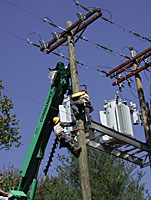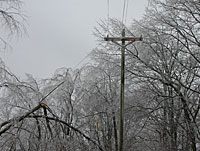Safety Tips

Electricity is safe as long as you treat it with respect. It is our most common energy source and helps make life fun, safe, and more convenient than ever. It is everywhere and it is very powerful. Knowing electric safety will help you more securely enjoy all that electricity can offer.
- Stay away from electrical power equipment
- Don’t fly kites, balloons, model airplanes, etc. in the rain
- Never climb a utility pole
- Never touch outdoor wires or anything in contact with them
- Call MISS UTILITY before you dig in your yard: 1-800-552-7001
- Limit the number of appliances plugged into an outlet
- Never put your finger or anything else other than an electrical plug in an outlet
Downed Power Lines
Accidents and weather conditions are the main causes of downed power lines. If you come across a downed power line you should stay as far away from it as possible. Treat all downed wires as if they are “hot”. Never attempt to touch or move a downed power line or to remove trees from power lines. Remember, even a dead line may be re-energized by automatic equipment. Downed power lines should be reported immediately. We will send our crews out to restore power as quickly as possible. Please stay away from downed lines, even if you know they are not electric lines. It is possible that the line could have come in contact with an electric line when it fell, causing the downed line to be hot.
Substations
A substation reduces a higher voltage (46KV) to a lower voltage (7.2 KV) for distribution to your house. A substation has a fence and barbed wire on top of it to keep you safe. The equipment inside of a substation fence uses HIGH VOLTAGE that could kill or seriously injure anyone coming in contact with it.
Wiring Your House
Whether you are a new or long-time house owner, you should adhere to the following home wiring guidelines:
Have wiring installed and checked by a qualified electrician. Make sure your appliances are approved by Underwriters Laboratories or another authorized laboratory. Check to see if your house is receiving at least 100 amp service. For full house power, you will need at least 150-200 amps.

Electrical Appliances
Keep combustible materials away from heating devices and lamps
- Keep combustible materials away from heating devices and lamps
- Do not touch plumbing or metal while in contact with an appliance
- Unplug all electrical devices when cleaning
- Do not touch an electrical appliance while standing in water or while wet
- Never leave appliances on if you are leaving for an extended period of time
- Never leave Christmas lights unattended
Power Tools
- Store power tools and cords in a dry place
- Keep tools and shop area free of flammable substances: rags, shavings, papers, etc.
- Keep tools away from flammable gases and vapors
- Repair a cord break by getting a NEW ONE
Power Cords
- Situate cords outside of normal traffic areas so that people will not trip on them
- Keep cords away from water and heat at all times
- Do not pull a cord out of an electrical socket by jerking on the cord; instead, pull on the plug itself
